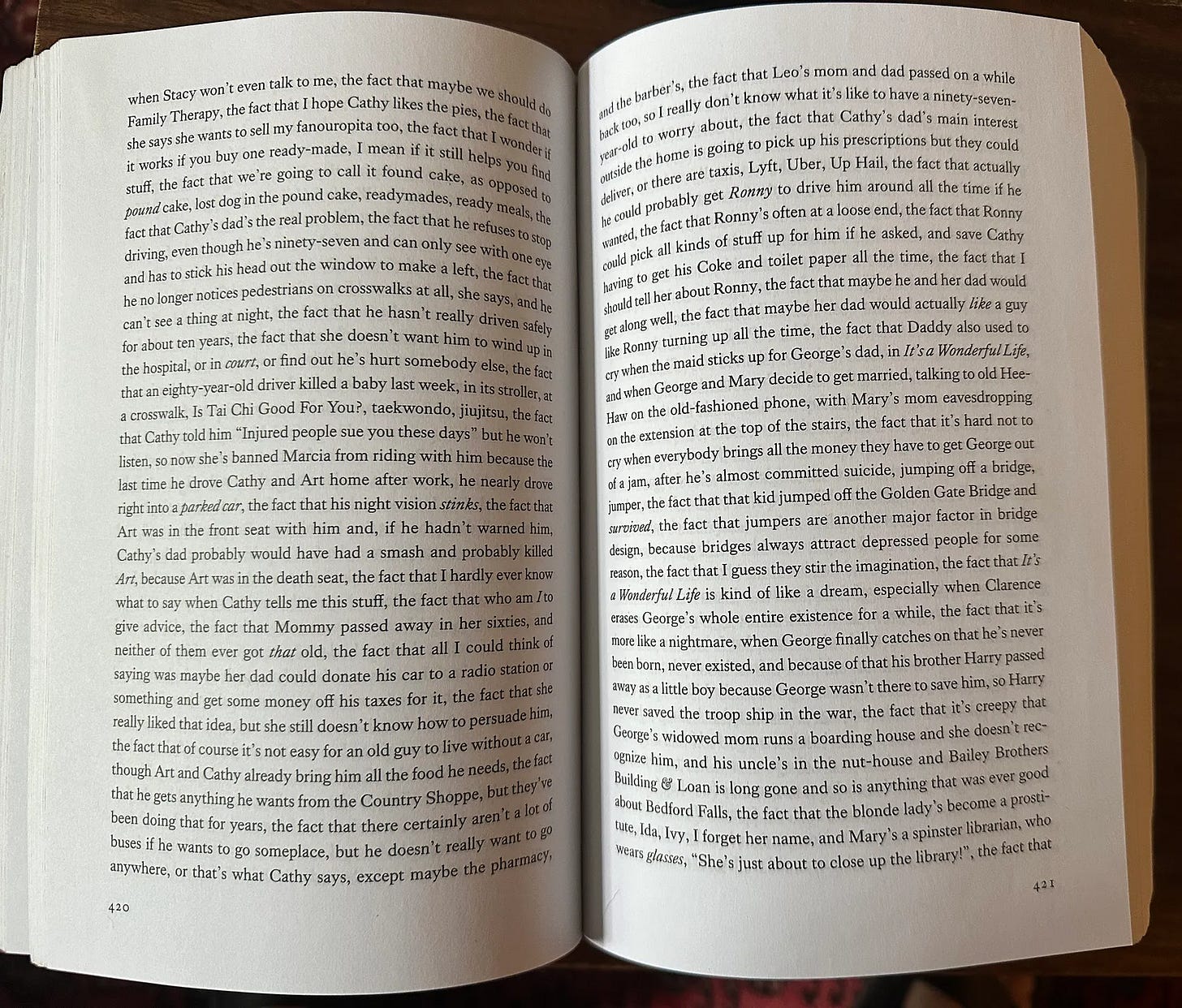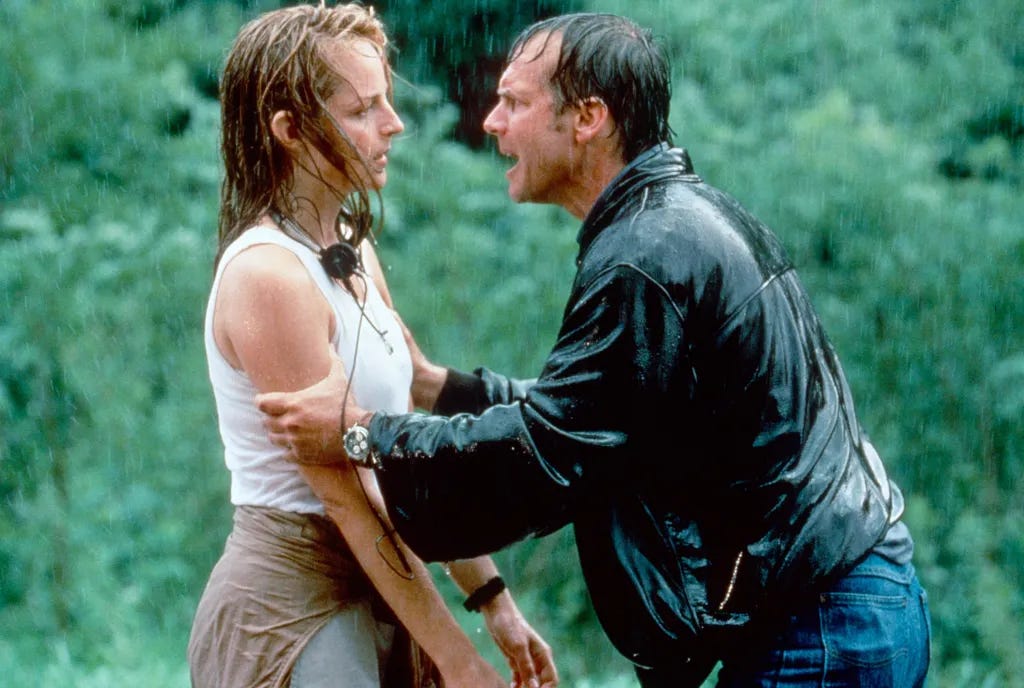Balanced media diet: Twister (1996)
Leave interiority to books, let beautiful people kiss: a unifying theory, ft. Twister & Ducks, Newburyport
Moving on from the last post about introspective books that help reset my brain into a slower, kinder mindset, now I simply must talk about the 1996 movie, Twister.
My thesis is: books should be smarter, weirder, and sometimes smaller — and movies should be dumber. A balanced media diet! My complaint about many women’s lit-category books is that they are undone by characters that behave in baffling and inconsistent ways to serve the plot. That’s what movies are for!
I recently watched, for the first time, the original Twister. And it ruled! Everyone was hot! It had the plot structure of a rollercoaster ride! Up a hill, down a hill, big things crashing into your face, a few big turns where you’re teetering off the tracks, but never too dangerously.
It was the single most American movie I’ve watched in a while: loud and safe. At no point did I believe anything “bad” would happen to anyone or any dog, except for the very obvious evil blonde, who gets a bloodless death as penance for ignoring sage advice. Even the horses are okay in the end. I assume the cows we see spin by in a tornado eventually land safely, ready to be factory-farmed into hamburgers.
Helen Hunt looks great in a tank top! She looks like a normal (hot) 33-year-old, with lines on her face and mobile eyebrows. As my friend Rachel put it, everyone has their own teeth! Hunt’s character, Jo, gets a backstory in the opening scenes about her dad dying via the Worst Tornado. This comes up once or twice but only when narratively necessary to spur the plot forward and remind us that she’s allowed to be emotional about tornado chasing.
Bill Paxton’s Bill has no such interiority. He’s marrying a therapist and trying to play it safe as a weatherman until about 3 minutes of plot convince him to abandon both completely. What’s his motivation to do either? The love of the game, presumably. Who cares! All the characters are committed to the central storyline that if they do this one scientific act, they’re going to save the world (America) from tornadoes forever. The power of the individual! Hoorah, etc!
Too many movies destined for summer air-conditioning-powered entertainment (action movies, superhero movies) dwell too long on the reason why our hero wants to punch bad guys or solve the problem at hand. And that’s fine, some movies can plumb the depths of human desire, the contradictions of our psyches, blah blah blah — but must they all? What if movies stay in their lane? Specifically, the lane I just made up: a rollercoaster ride with a few loop-de-loops, but you’re buckled in for safety.
I want to feel the spirit of cinema in the room with me, not understand the emotional lives of the rollercoaster itself! Beautiful but simply-drawn people arguing over solvable plot hurdles! This is why Challengers worked — it’s big and loud with just the vaguest gestures toward the leads’ backstories. Any more and, quite frankly, who cares! Drop the beat again!
To return to my unified theory, I read books to grow, learn, meditate, and change. Movies, less so. I hope it goes without saying that it is both culturally and individually regressive to lean too hard on the dumb stuff. That’s why I’m arguing for balance! Anyone who consumes exclusively challenging, creatively ambitious media, is almost certainly not reading this anyway.
I have not watched the new Twisters (2024), but I have already been told there’s a sad backstory we spend too much time on! For this, I blame Christopher Nolan.
As this newsletter is ostensibly about books, let us now balance all this talk about flat characters storming around (pun intended) and big plots with the single most interiority-driven book: Ducks, Newburyport. I have only read 420 pages of this 1,000-page book, but I think about it often. “Literary” fiction is often characterized as being more character-driven than plot-driven. This book is that distinction taken to the absolute extreme.
It is 1,000 pages of run-on sentences in the mind of an American housewife, capturing circular thought patterns, anxieties, and observations. Every thought starts with “the fact that…” with commas doing the work to splice up the stream of thought and make it readable. To tell a story, most books have to omit some elements of their character’s day-to-day and inner lives. Fictional characters, unlike real human beings, are a distillation of a few central motivations and relationships. Not so in Ducks.
As an art form, books uniquely launch us straight into the mind of a stranger, in a way that few other mediums can. Even in good book-to-movie adaptations, some of that is lost — it’s hard to pull off voice-over in an emotionally convincing way. Ducks is truly hell-bent (and successful) at capturing what it’s like to be a person in the world, or at least, this very, very specific person. I truly think it is worth indulging in 10-20 pages of the book to admire the audacity.

Books, to me, do not need to be diverting dopamine bombs. There are lots of books out there that serve this function, with rollercoaster-like plot structures that keep you turning the pages. That’s what I turn to movies for. I enjoy books best when they are driven by recognizable human emotion.1 Both Ducks and Twister are stories about small-town Americana, but otherwise, they’re worlds apart. Enjoying them both is part of a balanced media diet.
Let the feast continue. I would love to hear recommendations for either:
Big, fun movies (ideally ones where the people are compelling and the plot is not a low-key endorsement for imperialism)
Books driven by character’s interior lives
I think this is why my criticism of most romance novels is “too much romance.” In order to serve the genre conventions, romance novel characters are flattened to make the plot jumps faster — all of this works just fine in movies. Personal preference, certainly!





I say we challenge ourselves: what other movies does this also apply to? " At no point did I believe anything “bad” would happen to anyone or any dog, except for the very obvious evil blonde, who gets a bloodless death as penance for ignoring sage advice." I'll start - The Parent Trap
Assume the original Star Wars trilogy fits into this theory, yes?